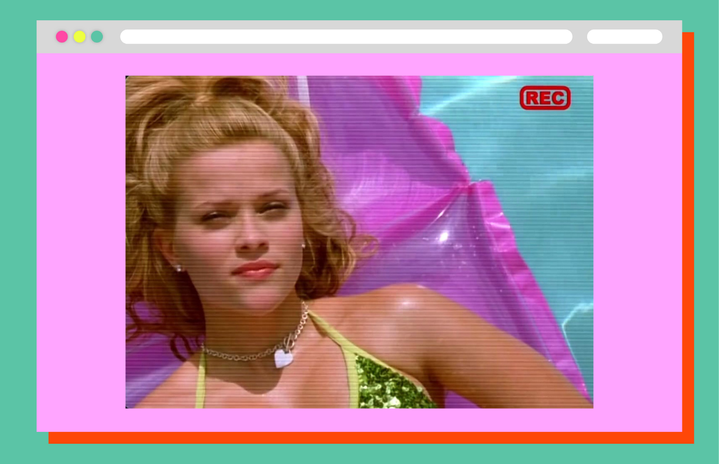Legally Blonde (2001) might be a film about rich white people fighting with one another over issues most of us won’t relate with. However, it still happens to be a guilty pleasure for the masses for how it portrays the journey of its protagonist Elle Woods who initially gets belittled and fetishised, but goes on to prove her worth to the ones around her. While Woods is immensely capable and ridiculously privileged in the film, she is stereotyped as an unintelligent blonde and is underestimated by the other characters as a result of the same. There is, nonetheless, another reason why she is ridiculed—she is newly-moneyed as opposed to the ones she aspires to imitate and win over.
Woods is introduced to us—the viewers—as a filthy rich sorority president who spends quite a lot of time primping herself at the start of her day. With this, the camera shifts towards multiple designer logos which include Tiffany and Prada. If her introduction is compared to that of the old-moneyed characters in the film—Warner Huntington III and Vivian Kensington—it becomes evident that the latter don’t appear as visibly rich as Woods. Huntington and Kensington usually dress in serious shades of blacks, browns, greys and whites with occasional blues and purples as opposed to the eye-catching shades of pinks and reds that Woods chooses to embrace. Kensington’s choice of clothes and accessories are also in stark contrast to that of Woods—her signature accessory is a pearl necklace with frequent turtlenecks whereas Woods wears shiny and glittery belts and bracelets with wedges that have fake diamonds on them. In other words, the former represents the traditional and somewhat conservative East Coast whereas the latter is a stereotypical newly-moneyed West Coast girl.
Something else can be noticed about Woods is how often she uses the term “like” while talking. As mentioned in a Guardian article, “Most people think the word “like” dates back to the 80s, as typified by the Frank Zappa song Valley Girl, in which his daughter, Moon Zappa, impersonates a California bimbo.” Woods is, in a way, considered “a California bimbo” by most male characters in the film, similar to what is mentioned in the article.
There are numerous other moments in which references to aforementioned clichés about the women of California, particularly the blonde haired ones, are made. When Woods enters Harvard Law School, she is immediately labelled as a “Malibu Barbie” by a person who doesn’t even know she is from California; perhaps, due to her being dressed in loud colours and big designer logos from top to bottom. Furthermore, even Brooke Windham—Woods’ sorority sister whom she defends in a murder trial—is called a “little tart from California” by her late husband’s ex-wife. The assumption that most of the secondary characters in the film have about women like Woods and Windham is that not only are they dull-witted by virtue of being blondes, but are even unambitious because of the conventional image of hyper-feminine California women being “trophy wives”, which Woods’ mother also seems to be.
In contrast to Elle Woods being “California rich”, her ex-partner, Warner Huntington III, is “Connecticut rich”. According to a report published by Forbes in 2013, both California and Connecticut are inhabited by the elites of America. However, there is still a distinction made between the two in the film. The first time this happens is when Huntington breaks up with Woods under the pretext that he needs to be more “serious” in life. In his entire conversation with her, Huntington points out the different ways in which she is unfit to be his wife, most of them being related to her California upbringing. To begin with, he says he needs to marry “a Jackie, not a Marilyn”. While many would take this as him wanting to choose an academically inclined brunette instead of a blonde “Victoria Secret model”, as Woods refers to herself later on in the film, his reasoning is actually much more nuanced. Jackie Keneddy was someone who was born in an affluent family and spent her childhood years in Long Island and Manhattan, in the East Coast. Marilyn Monroe, on the other hand, was born in California and was raised by her mother who was financially unstable. Thus, Huntington, by comparing Woods to Monroe, indirectly conveys that he looks down upon her California roots. When Woods tries to convince him to rethink his decision of leaving her by saying that his family would find her agreeable like everyone else she knows, he replies saying, “…East Coast people are different.”
As Huntington further mentions in his break-up speech, his family has had “five generations of senators” which is a way for him to say that they have seen wealth for at least a century. This information is immediately followed by him telling Woods that his elder brother is engaged to a Vanderbilt which, judging by his tone, is a reference to the once richest family of the United States based in the East Coast. His explanations are met with annoyance from Woods’ side with her asking, “…just because I’m not a Vanderbilt, suddenly I’m white trash?” She, perhaps, still unaware of her partner’s bias towards the East Coast, tries to make her case by telling him that she “…grew up in Bel Air…across the street from Aaron Spelling.” However, by doing so, she only worsens her argument because her growing up in California is one of the primary reasons behind him wanting to end things with her.
In the scenes that follow, Woods is shown to believe that she will be able to rekindle her romance with Huntington if she somehow manages to become a book-smart law student, which is her definition of “serious”. She also decides to change her physical appearance to resemble that of a Vanderbilt, completely oblivious to the fact that neither of these would change Huntington’s opinions—he isn’t just looking for a law student who dresses in shades of green, but is actually wishing to settle down with someone whose last name reveals their old-moneyed ancestry. That is where Vivian Kensington comes in—a young girl from Connecticut who belongs to the same country club as him. Elle Woods might be the president of Delta Nu, but she can still not gain entry into a country club because membership into such clubs is, after all, inherited and not earned.
It must be noted that it isn’t just the East Coast people who look down upon the West Coast ones; even the opposite constantly happens in the film. When Woods shows the image of Huntington’s elder brother’s fiancé to an old lady at a beauty salon, the woman calls the Vanderbilt girl “practically deformed”. Further, when Woods is asked whether or not Kensington has an edge over her, she responds saying, “…she could use some mascara and some serious highlights, but she’s not completely unfortunate-looking.” Thus, while the old-moneyed crowd from the East Coast looks down upon those who represent the newly-moneyed West Coast for their style of clothing and mannerisms, the latter also form judgements about the former over their physical appearances—the critique and superficiality aren’t one-sided.
Kensington’s character, when juxtaposed with Woods’, is not just subtle, but even snobbish—another trait typically associated with the old-moneyed. This is, in fact, something that Woods feels about most people at Harvard when she exclaims, “People here are so vile!” while talking to her friends from back home. Alongside that, Kensington’s class background ensures that she doesn’t have the same insecurities as Woods and remains unaffected by both criticism and flattery. This can be seen when she receives a compliment about her looks from Woods on the first day of their internship, but doesn’t bother to return it. In fact, she even thanks her in an extremely cold manner, as if to say that she doesn’t care about validation. A few scenes later, Kensington, impressed by the loyalty that Woods shows towards her sorority sister, Brooke Windham, ends up referring to her act as “classy”. Even then, she almost swallows the word in her mouth because she is not used to viewing Woods as a person with class.
Saying that the class divide in Legally Blonde is oppressive towards Elle Woods would be pushing it too far because even she doesn’t seem to take notice of it in the film. However, with her finally being able to find her place at Harvard while outperforming and eventually rejecting characters like Huntington, we get the message that old-money might help one get into an ivy league, but it can certainly not guarantee success there. Additionally, the popularity of Woods’ character can be compared to that of the nouveau riche Kardashians—even if most of us find her style to be tasteless, we would still prefer it over the bland, unexciting wardrobe of Kensington.


